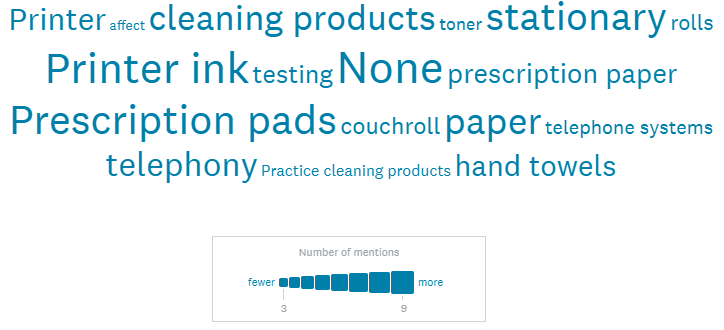EU Exit Planning: Non-Clinical Goods and Services
![]() Thank you for responding to our recent survey on practice needs in the event of a no-deal Brexit. We rely on your input.
Thank you for responding to our recent survey on practice needs in the event of a no-deal Brexit. We rely on your input.
Following a discussion at our Annual General Meeting on Thursday 24 January, we asked you about the impact of a no-deal EU exit on your practice-critical Non-Clinical Goods and Services (NCGS). Medical devices, clinical consumables and medicines are being considered separately.
We asked you to consider:
- The dependency of those goods/ services on that front-line service;
- The criticality of that front-line service and its clinical importance; and
- Outsourced services such as equipment maintenance.
We had a really good response and have been able to advise officials about supply concerns across London in good time. Whilst there were a number of respondents who are unconcerned about the impact of no-deal Brexit, those who do harbour concerns highlighted a number of non clinical products and services which they fear might be affected. These include:
- Stationary;
- Printer ink;
- Prescription pads;
- Couch roll;
- Paper;
- Telephony;
- Cleaning products;
- Prescription paper;
- Printer;
- Hand towels;
- Testing;
- Telephone systems;
- Practice cleaning products; and
- Toner.
We will continue to work with officials to identify and anticipate the impact of Brexit on London general practice, be it no-deal or otherwise. Other possible EU exit risks include:
- Goods or services that have supply chain touch points in the EU;
- Personal data held in EU member countries;
- Supply routes into the UK via Dover/ Calais; and
- Dependencies on EU regulations.
If you have any comments or questions about this work, please contact us.
This word cloud gives some indication of respondents' concerns.

October 2015 newsletter now available (15 Oct 2015)
Londonwide LMCs NewsletterTamiflu in nursing and care homes (14 Oct 2015)
In January the GPC sought legal advice on Public Health England’s (PHE) instructions to prescribe Tamiflu for the prophylaxis of influenza in nursing and care homes where there have been...Improving well-being and health for dementia patients workshop (14 Oct 2015)
WHELD Research Programme (Improving Wellbeing and Health in Dementia) have organised an Royal College of General Practitioners accredited workshop for GPs in London. It will discuss anti-psychotic medication and no-pharmacological...Clinical Commissioning Group Outcomes Indicator Set - participation voluntary (14 Oct 2015)
Advice has been sought from the BMA General Practitioners Committee’s IT Subcommittee on the Clinical Commissioning Group Outcomes Indicator Set (CCG OIS) for 2013/14 and 2014/15. Practices have been asked to sign...Year-end deadline for agreement of GP Systems of Choice and GP IT services (14 Oct 2015)
NHS England has published an agreement for signature by practices and Clinical Commissioning Groups (CCGs) setting out the provision of GP Systems of Choice (GPSoC) and GP IT services. The...Death in service benefits for locum GPs - are you covered? (14 Oct 2015)
You may already be aware that there are persistent current inequities regarding the entitlement to ‘death in service’ benefit for freelance/ locum GPs compared to their principal or salaried GP...Healthwatch ask General Practice Committee for transparency on additional charges (14 Oct 2015)
The General Practitioners Committee (GPC) recently met with Healthwatch England to discuss charges that GPs can make for work not covered by their contract. Whilst the patient group understands the...New London Ambulance Service proposals to introduce non-emergency transport (14 Oct 2015)
London Ambulance Service (LAS) have consulted with us about a new service which they are implementing to help them manage the need for emergency ambulances more efficiently. A letter outlining...Meningococcal B for infants – FAQs update (14 Oct 2015)
NHS Employers have updated their vaccs and imms FAQs in relation to meningococcal B for infants to explain the eligible age cohort (2 – 13 months), as well as a catch-up...Nursing and Midwifery Council revalidation (14 Oct 2015)
The Nursing and Midwifery Council (NMC) have introduced revalidation for all nurses and midwives in the UK: the most significant change to regulation in a generation. Revalidation means that everyone...Guidance
We provide expert guidance for practices in our guidance section, as well as an archive of other materials you may find useful.
GP Support
Contact our GP Support team if you need help or advice.
The team provide professional and pastoral support to GPs and practice teams on a broad range of issues.

